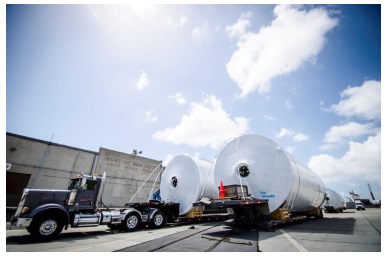
Beer Fermentation Tanks at San Diego’s Tenth Avenue Marine Terminal awaiting shipment to the Ballast Point brewery in nearby Miramar.
Photo/Port of San Diego
The new transactions include accepting containerized export loads and receiving and releasing empty containers. The expanded-transaction trial begins May 10. Other nighttime transactions already in place include:
"We’re counting on harbor drivers to take advantage of these added nighttime features," said Port of Oakland Maritime Director John Driscoll. "This is what cargo owners have been asking for and the terminal operator and Port have been listening."
Extra gate hours are intended to give harbor truckers more time to pick-up and deliver containerized cargo. Until recently, they had only been allowed through terminal gates on weekdays. By working nights or Saturdays, drivers can avoid lines that sometime build up on the dayside Monday through Friday.
Oakland International Container Terminal said it is conducting up to 600 transactions every night and 1,200 on Saturdays. The port expects those numbers to grow as more business migrates from weekday operations.
Giant Beer Fermentation Tanks Shipped to Port of San Diego for Local Brewing Company
Four 24-ton fermentation and storage tanks destined for local brewing company Ballast Point Brewing & Spirits arrived at the Port of San Diego on April 28. The tanks were manufactured in Ludwigsburg, Germany, and loaded aboard the vessel M/V Star Lysefjord in Antwerp, Belgium, for transport to San Diego’s Tenth Avenue Marine Terminal.
The 69-foot tall tanks will be used to produce beer at Ballast Point’s Miramar (CA) brewery, about 17 miles from the port.
Until recently, the company shipped most of its equipment through other ports and trucked it to San Diego.
Recently, the company determined that San Diego’s close proximity to the company’s brewing locations, plus its experience with specialty breakbulk cargo made it an ideal port to handle this heavy equipment. Ballast Point plans to import additional equipment via the Port of San Diego.
"We are fortunate to have experienced rapid growth recently, and with that we must keep up with increased distribution," said Hilary Cocalis, Vice President of Marketing for Ballast Point. "We are constantly adding new tanks and equipment to expand production at our main Miramar brewery. It’s always a happy day at the brewery when new tanks are dropped into place, and we’re glad the Port of San Diego has helped ensure this latest shipment arrived to us safely and efficiently."

Beer Fermentation Tanks at San Diego’s Tenth Avenue Marine Terminal awaiting shipment to the Ballast Point brewery in nearby Miramar.
Photo/Port of San Diego